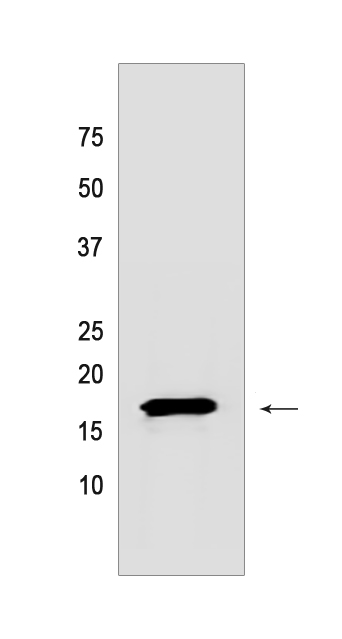SUMO1 Rabbit mAb [6339]Cat NO.: A66850
Western blot(SDS PAGE) analysis of extracts from SW480 cells.Using SUMO1 Rabbit mAb [6339] at dilution of 1:1000 incubated at 4℃ over night.
Product information
Protein names :SUMO1,SMT3C,SMT3H3,UBL1,OK/SW-cl.43,SUMO1_HUMAN,Small ubiquitin-related modifier 1
UniProtID :P63165
MASS(da) :11,557
MW(kDa) :17kDa
Form :Liquid
Purification :Protein A purification
Host :Rabbit monoclonal IgG
Isotype :IgG
sensitivity :Endogenous
Reactivity :Human,Mouse,Rat
- ApplicationDilution
- 免疫印迹(WB)1:1000-2000
- 免疫组化(IHC)1:100
- 免疫荧光(ICC/IF) 1:100,
- The optimal dilutions should be determined by the end user
Specificity :Antibody is produced by immunizing animals with a synthetic peptide of human SUMO1.
Storage :Antibody store in 10 mM PBS, 0.5mg/ml BSA, 50% glycerol. Shipped at 4°C. Store at-20°C or -80°C. Products are valid for one natural year of receipt.Avoid repeated freeze / thaw cycles.
WB Positive detected :SW480 cells
Function : Ubiquitin-like protein that can be covalently attached to proteins as a monomer or a lysine-linked polymer. Covalent attachment via an isopeptide bond to its substrates requires prior activation by the E1 complex SAE1-SAE2 and linkage to the E2 enzyme UBE2I, and can be promoted by E3 ligases such as PIAS1-4, RANBP2 or CBX4. This post-translational modification on lysine residues of proteins plays a crucial role in a number of cellular processes such as nuclear transport, DNA replication and repair, mitosis and signal transduction. Involved for instance in targeting RANGAP1 to the nuclear pore complex protein RANBP2. Covalently attached to the voltage-gated potassium channel KCNB1,this modulates the gating characteristics of KCNB1 (PubMed:19223394). Polymeric SUMO1 chains are also susceptible to polyubiquitination which functions as a signal for proteasomal degradation of modified proteins. May also regulate a network of genes involved in palate development. Covalently attached to ZFHX3 (PubMed:24651376)..
Subcellular locationi :Nucleus membrane. Nucleus speckle. Cytoplasm. Nucleus, PML body. Cell membrane. Nucleus.
IMPORTANT: For western blots, incubate membrane with diluted primary antibody in 1% w/v BSA, 1X TBST at 4°C overnight.


